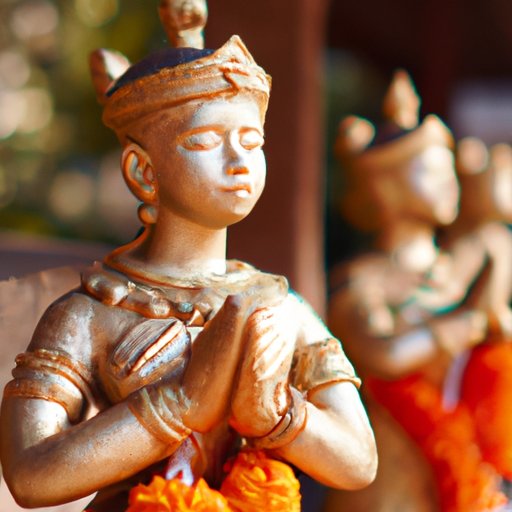Introduction
Culture and religion are two fundamental aspects of society that have been intertwined throughout history. While they are distinct concepts, they often overlap and influence each other in various ways. In this article, we will explore the relationship between culture and religion, looking at their differences and similarities, as well as their historical connections and impacts on one another.

Analyzing the Differences and Similarities between Culture and Religion
To understand the relationship between culture and religion, it’s important to first define these terms. Culture can be broadly defined as a shared set of values, beliefs, and practices that are passed down from generation to generation. It includes a variety of elements, such as language, art, music, and customs. Religion is a belief system that encompasses a set of teachings, rituals, and moral codes that help guide people’s lives. It is typically associated with a particular faith or deity.
Though culture and religion are distinct concepts, they often intersect and influence each other in various ways. For example, many religions have strong cultural components, such as language, art, music, and customs. Similarly, many cultures have strong religious components, such as beliefs about the afterlife, deities, and rituals. Furthermore, both culture and religion involve systems of shared values, beliefs, and practices that are passed down from generation to generation.

Exploring the Historical Connections between Culture and Religion
Throughout history, religion has had a major impact on the evolution of culture. In many societies, religion has served as a source of social cohesion, providing a common set of values, beliefs, and practices that people could rally around. Furthermore, religious texts were often used as a way to record and preserve cultural history. For example, the Bible is an important source of information about the ancient Hebrews and their culture.
Religion has also been a major influence on art and literature. Many works of art and literature have been created to honor and celebrate religious figures and beliefs. Furthermore, religious texts have provided inspiration for countless works of art, literature, and music over the centuries.

Examining the Impact of Religion on Culture
Religion has had a major impact on the development of cultural norms and values. In many societies, religious beliefs have been used to justify certain behaviors and laws. For example, in some societies, religious beliefs have been used to justify laws prohibiting same-sex relationships or marriages. Similarly, in some societies, religious beliefs have been used to justify laws prohibiting certain types of clothing or hairstyles.
Religion has also been used to shape cultural attitudes towards different social issues. For example, in some societies, religious beliefs have been used to shape attitudes towards gender roles, marriage, and family life. Furthermore, religious beliefs have been used to shape attitudes towards education, science, and medicine.
Though religion has had a major influence on the development of cultural norms and values, it is important to note that not all religious beliefs are accepted by all cultures. For example, in some societies, religious beliefs that contradict cultural norms may be rejected or even persecuted.
Investigating How Culture Shapes Religious Beliefs
Just as religion has shaped culture, culture has also shaped religious beliefs. The environment in which people live can have a major impact on their religious beliefs. For example, people living in a desert climate may develop a religious belief system that revolves around water, while people living in a forested area may develop a religious belief system that revolves around nature.
Cultural beliefs can also shape religious beliefs. For example, some cultures may place a greater emphasis on certain religious beliefs than others. Similarly, some cultures may embrace certain religious practices while rejecting others. Furthermore, cultural beliefs can shape attitudes towards religious figures and texts.
Comparing Different Cultural and Religious Perspectives on the Same Issue
One of the most interesting aspects of the relationship between culture and religion is the way in which different cultures and religions view the same issue. For example, different cultures and religions have very different views on topics such as marriage, divorce, abortion, and gender roles. By understanding the differences between these perspectives, we can gain a better appreciation for cultural and religious diversity.
Furthermore, by understanding different cultural and religious perspectives on the same issue, we can gain a better understanding of our own beliefs and values. By comparing our own beliefs and values to those of other cultures and religions, we can gain a deeper understanding of our own beliefs and values, as well as the beliefs and values of others.
Conclusion
In conclusion, culture and religion have been intertwined throughout history, influencing each other in various ways. Religion has played a major role in shaping cultural norms and values, while culture has shaped religious beliefs. Furthermore, different cultures and religions have very different views on the same issues, providing insight into the diversity of beliefs and values across cultures and religions.
By understanding the relationship between culture and religion, we can gain a better appreciation for the diversity of beliefs and values across cultures and religions. Furthermore, we can gain a deeper understanding of our own beliefs and values, as well as the beliefs and values of others.
(Note: Is this article not meeting your expectations? Do you have knowledge or insights to share? Unlock new opportunities and expand your reach by joining our authors team. Click Registration to join us and share your expertise with our readers.)
